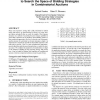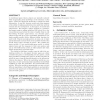55 search results - page 11 / 11 » Settling the Complexity of Computing Two-Player Nash Equilib... |
ATAL
2007
Springer
13 years 11 months ago
2007
Springer
Agents engaged in noncooperative interaction may seek to achieve a Nash equilibrium; this requires that agents be aware of others’ rewards. Misinformation about rewards leads to...
GECCO
2005
Springer
13 years 10 months ago
2005
Springer
Many non-cooperative settings that could potentially be studied using game theory are characterized by having very large strategy spaces and payoffs that are costly to compute. Be...
SIGECOM
2006
ACM
13 years 11 months ago
2006
ACM
In traditional game theory, players are typically endowed with exogenously given knowledge of the structure of the game—either full omniscient knowledge or partial but fixed in...
SIGECOM
2008
ACM
13 years 5 months ago
2008
ACM
This paper studies a virus inoculation game on social networks. A framework is presented which allows the measuring of the windfall of friendship, i.e., how much players benefit i...
IPTPS
2004
Springer
13 years 10 months ago
2004
Springer
In P2P systems, users often have many choices of peers from whom to download their data. Each user cares primarily about its own response time, which depends on how many other use...


